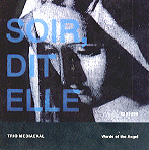Okay, it’s inevitable that listeners to this outstanding CD will compare it to recordings by the world’s most renowned female early music vocal ensemble, Anonymous 4. All I can say is that if you like the Anonymous 4 sound and its medieval chant/early polyphony repertoire, you’ll certainly enjoy this. But if Anonymous 4’s sound is the embodiment of clarity and purity of tone, Trio Mediaeval’s is more varied shades of color, with timbres that are less-filtered and more overtly individual. Where Anonymous 4 uncannily and remarkably sounds as one voice, Trio Mediaeval is clearly three. And yet, this group is every bit as unified in interpretive nuance, in breathing, and in phrasing as that illustrious quartet. Indeed, as the liner notes remind us, the Tournai mass–a 14th-century compilation of anonymous polyphonic musical settings of the “ordinary” texts–would not have been sung by women. However, when you hear it performed by these singers–Anna Maria Friman, Linn Andrea Fuglseth, and Torunn Østrem Ossum–you forget all about whatever official restrictions the church hierarchy may have imposed on the performance of liturgical music hundreds of years ago, and you just appreciate how perfectly suited these compositions are for treble voices, especially ones of such refinement and sensitivity.
Trio Mediaeval infuses all of its performances with lots of energy, movement, and rhythmic impulse. These are not interpretations that seek to live in some distant, mystical past, but rather are very much in the present, charged with life and guided by modern tendencies toward more overt expression. These more individual expressive gestures are evident most of all in the selections that are interspersed between the mass movements–anonymous songs, both polyphonic and single-voice–that range from the dance-like In excelsis gloria to the strangely beautiful Benedicta es celorum where the highest voice sometimes sounds more like a soloist with accompaniment.
Most intriguing–and worth the price of the CD–is Ivan Moody’s Words of the Angel, a work written in 1998 for Trio Mediaeval that shows just how ancient part-writing techniques allied with a modern, adventurous sense of harmony and a creative spirit unfettered by traditional rules can produce a work of sublime, stunning beauty. The engineering couldn’t be more complementary to the vibrant timbres and lively presence of these three singers and their structurally simple yet timelessly affecting music. The only readily available alternative to Trio Mediaeval’s Tournai Mass is the interpretively idiosyncratic yet deeply personal version by the all-male Ensemble Organum on Harmonia Mundi. Its quirky sincerity is more than matched by the emotion conveyed in Trio Mediaeval’s more straightforward realization–enhanced by the addition of Moody’s little masterpiece.
































